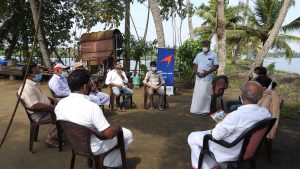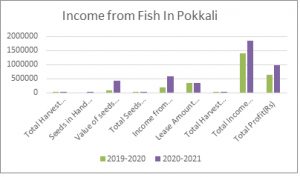The MS Swaminathan Research Foundation (MSSRF) has been taken up the task of reviving Pokkali paddy – a unique saline tolerant rice variety which cultivated along with extensive aquaculture in the coastal ecosystem.
The Pokkali rice is a unique system of cultivation found only in the Central Kerala coastline. It received the Geographical Indication (GI) tag in 2007 as its cultivation is known for the past 3000 years. It is popular for its unique taste and culinary uses.Besides, Pokkali rice is of extra-large grains and consists of several medicinal properties.

Pokkali paddy is cultivated every year during summer cropping (Kharif) season – June and October during the low saline phase, while filtered shrimp, prawn, or fish culture is cultivated in the high saline phase during November onward.In spite of its popularity and unique taste, its cultivation area and production has been sharply declined to 8500 hectares from 30,000 hectares in last three decades.
Scientists attribute unavailability of quality seeds, climate vagaries, increased cost of cultivation, and rising labor cost. Also, extension services to Pokalli growers and aquaculture practitioners were poor. The paddy is grown in standing water, so farm mechanization could not be introduced for its cultivation.
Kerala is highly vulnerable to climate change impact. It faces frequent natural calamities like consecutive floods, cyclones, and epidemics, which consequently cause social and economic crises. The need of the hour is to make the state more resilient to climate change vulnerabilities. The revival of Pokkali paddy farming would be one starting point where community, policy makers and civil society come together in rebuilding state more climate resilient while diversifying its agricultural base.
MSSRF interventions
Under the project HDFC Parivarthan, MSSRF has taken up the revival of the Pokkali cultivation. MSSRF’s scientists

created 12 model farms in three selected villages of Ernakulam district to increase the availability of Pokkali seeds. Scientists also provided quality prawn fingerlings to augment the availability of shrimps and fish to increase their income.
Besides inputs, the foundation also provides extension supports and labour supports.
MSSRF team activities led to increased production of Pokkali rice, cultivation area. It augmented the number of shrimps and fish in the region. The farmers could fetch extra income from these activities, and village-level seed production was increased through the 12 model farms created. The availability of quality seeds at a lower price reduced farmers’ dependency on other seeds (Kaippad).
The formation of farmers’ groups and distribution of Pokkali seeds and prawn fingerlings under their supervision made the farmers more self-assured and positively impacted. The project could ensure sustainable management of 12 hectares of Pokkali land, and 48 farmers in three villages (36 rice farmers and 12 fish farmers) form the project’s direct beneficiaries. Thus, the project could also ensure pure seeds of Pokkali to another 212 Acres of land in the subsequent seasons.
The foundation also collaborates with Kerala Agriculture University (KAU), and Rice Research Station, Vyttila, and other institutions in this effort.

